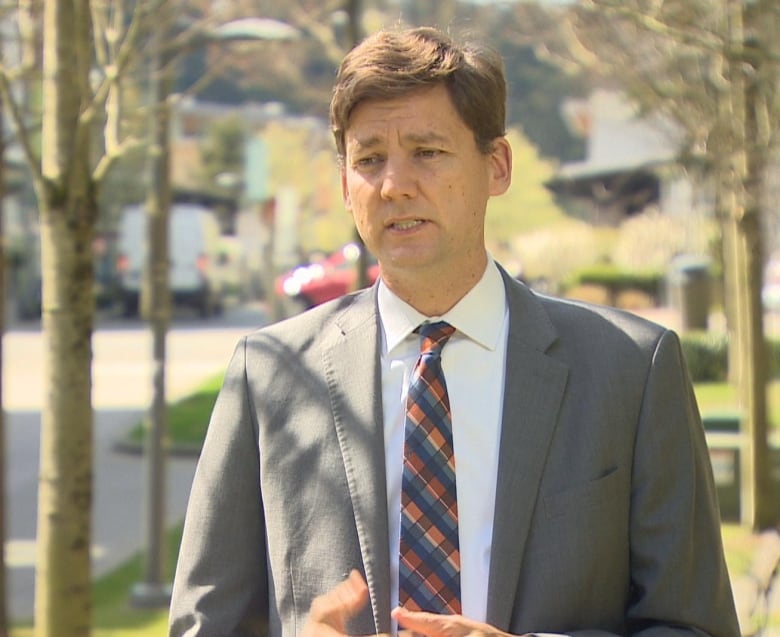Top judge takes rare shot at B.C. government over COVID-19 court closures
Chief Justice Christopher Hinkson blames province for 'unanswered' funding requests to modernize courts

In a rare display of public displeasure, the chief justice of the B.C. Supreme court has taken aim at the province — blaming it for earlier failures to fund modernization, now badly needed during COVID-19 related closures.
Chief Justice Christopher Hinkson has released a public statement, pushing back against recent comments the courts have been resisting change— contributing to a massive cutback in court hearings and trials due to coronavirus precautions.
"The Court has long been aware of the need to upgrade court technology in order to increase the Court's ability to provide remote and online access to justice," writes Justice Hinkson. "Over the years, numerous and repeated requests have been made to government to make the necessary and appropriate investments in this area."
But he says attempts to get that money have repeatedly failed.
"To date, however, requests for the financial investments necessary to make the strategy a reality have gone unanswered," says the chief justice.
Attorney General David Eby, responsible for the province's courts, says he understands Justice Hinkson's frustration — and he's working on trying to find a funding solution.

The lack of reform and digital solutions has left the courts unable to carry out most daily functions.
Only urgent criminal, civil, family and child welfare matters are being heard, along with simple "single issue" civil cases that can be handled in teleconferences lasting under one hour.
"I am acutely aware of the tremendous hardships that the suspension of regular operations causes for court users most notably accused persons and litigants," states Hinkson.
'Unfortunate' ... chief justice needs to defend himself
Attorney General David Eby says Justice Hinkson has a point — and he's already reached out to the province's top judge over the concerns raised.
"I definitely understand the frustration of the chief justice. He's right," said Eby. "The happy news of all this is that everybody is in agreement [with the] chief justice — our government, all the stakeholders — that we need to do more."
But the attorney general could not say when money would be available for technological changes in the court system.
"We are still in the process of funding requests and approvals by governments for the courts. There is definitely recognition of the need for those kinds of financial supports. But we're also working out exactly what the technologies are and what systems the court is most comfortable with," said Eby.
"There is a lot of commentary about the courts being out of step with technology and, you know, it's unfortunate whenever a chief justice feels they need to defend themselves."
But the attorney general was, himself, among those criticizing the legal system for failing to embrace change.
On April 17, he told CBC News "technology really hasn't penetrated the legal profession in the same way that it has so many other sectors."

'Massive, urgent action' needed
The B.C. Trial Lawyers Association is calling for a quick solution to the growing court backlog but agrees with Justice Hinkson that courts need provincial funding for technological solutions.
"The fact that British Columbia's courthouses are not securely online and capable of providing remote access to justice has nothing to do with B.C. judges," said John Rice, the president of the association.
"Judges are ready, willing and able to adjudicate online and remotely but they can't. The province's courthouses don't have the technological capacity to do so. COVID-19 has made plainly obvious how our underfunded justice system is so desperately in need of technological upgrades."
But Rice notes stakeholders are working together "to take massive, urgent action."

"Here, we have the attorney general of B.C., the judiciary and the legal community all rowing in the same direction and pushing for significant, systemic technological upgrades and reforms to our justice system," said Rice.
"In that sense, the coronavirus represents an opportunity to drastically improve access to justice in British Columbia."
Lack of tools 'hampering the courts'
Hinkson says in the face of the funding issue, the courts are doing the best they can — under the circumstances and under the law.
"The Court, supported by its judicial staff and by other courthouse staff, have worked tirelessly to expand the types of hearings," writes Justice Hinkson.
"The decision to suspend regular operations was a difficult one," he said, noting "the Court has a constitutional obligation to provide access to justice."
But he says there's only so much the courts can do, given health concerns during the pandemic.
"The lack of sufficient and effective tools has been hampering the Court's ability to adapt its processes."
CBC Vancouver's Impact Team investigates and reports on stories that impact people in their local community and strives to hold individuals, institutions and organizations to account. If you have a story for us, email impact@cbc.ca.
With files from Ethan Sawyer

